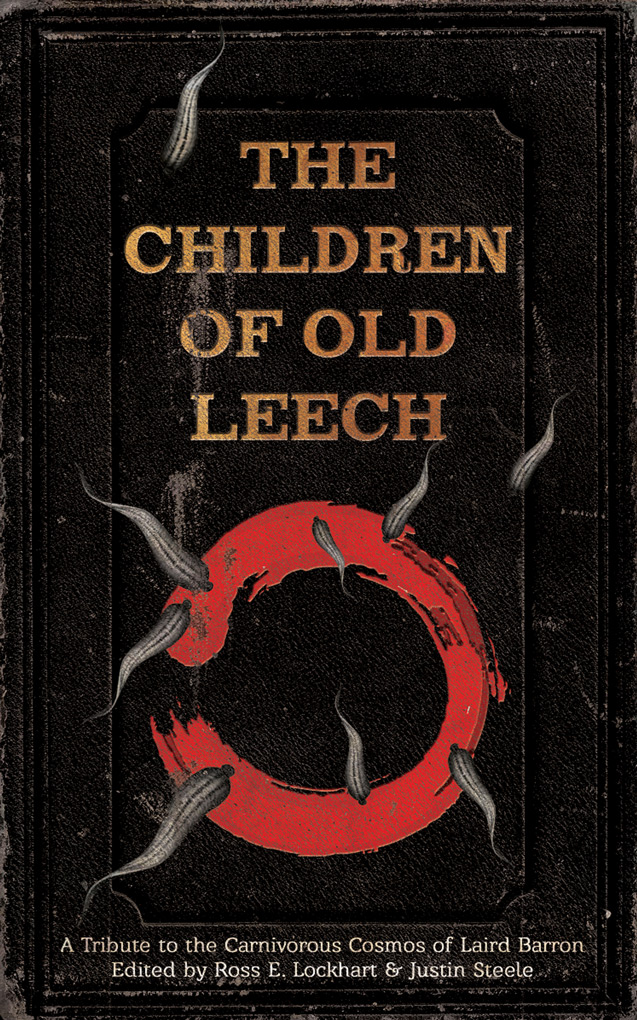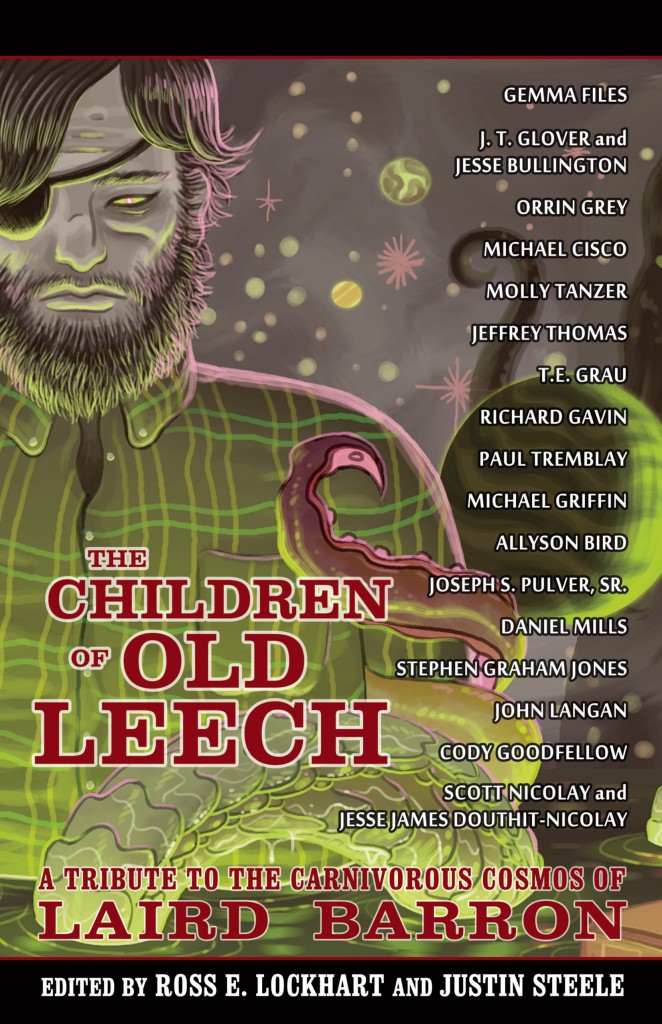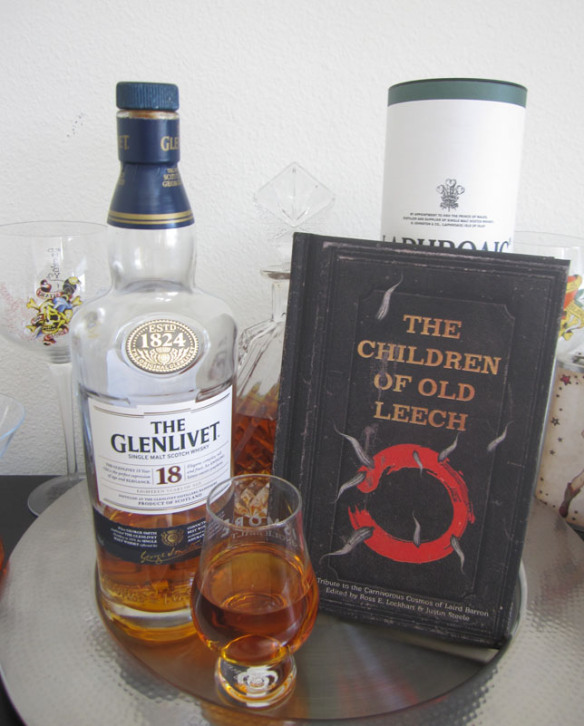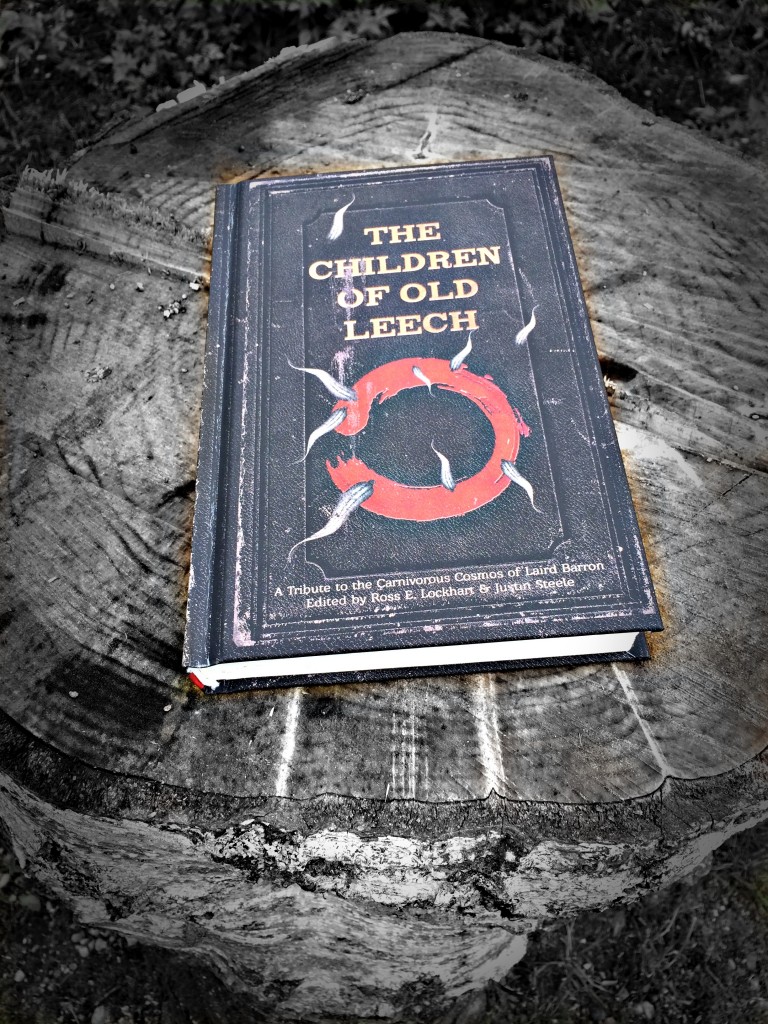We told you there would be more this week. What follows is Justin Steele‘s introduction to The Children of Old Leech, “Of Whisky and Doppelgängers.” And stay tuned for more!
—
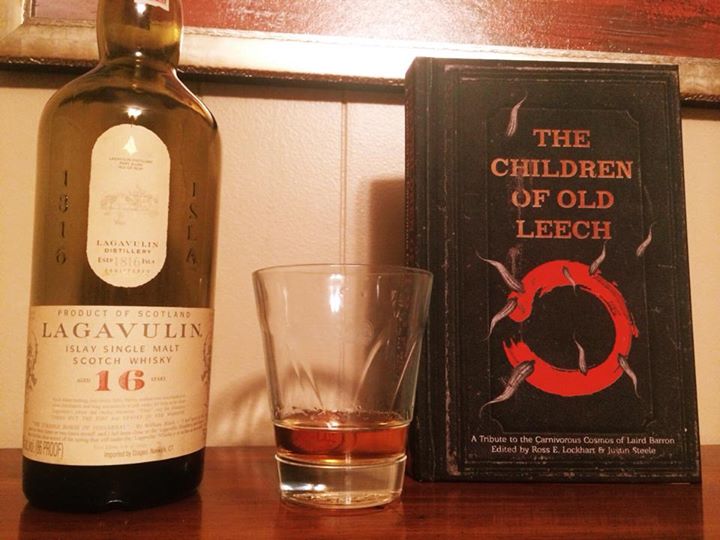
If you value your health, sanity, and general sense of well-being, then you should stop reading this book right now. Close the cover, put it back on the shelf, and head on over to the non-fiction section. Pick up a book on fishing, or pottery, something safe. Anything but this book.
If you’re still reading you must be damaged goods, nothing to lose. Maybe you saw that I started with a warning and felt the need to prove me wrong, to prove that you like to live life on the edge, laugh in the face of danger, shit like that. Maybe the warning tugged at your curiosity, intrigued you enough to carry on. Just remember what happened to the cat.
I’m supposed to be writing an introduction. That’s what Ross wanted me to do anyway, but I owe some responsibility to my fellow man, and what we did with this here book, what we unleashed, well, it’s just wrong. I’m sitting here at my desk, a near empty glass of Lagavulin on the desk edge, the bottle in easy reach. Three feet from me, propped in the corner of the room, is a 12-gauge pump-loaded with double-aught buckshot. If that’s not enough I have two .45s and a recently sharpened hunting knife within reach, so no matter how it goes down, it won’t go down easy. But who am I kidding. THEY want me to write this. It’s part of the project. Until my part’s done I’m safe. At least I think so.
I should probably start from the beginning. Tell you how I first discovered this Lovecraft guy, and how reading his fiction kicked me off onto this whole “weird fiction” thing, but I’m sure you’ve heard that one time and time again so I’ll skip ahead a little bit. A few Cthulhu Mythos anthologies into my tentacle binge, I picked up Ellen Datlow’s Lovecraft Unbound, and was pleased to see an anthology striving to avoid falling into pastiche territory. It was during my late night readings that I discovered my first Laird Barron tale. “Catch Hell” did something to me that only a few special stories managed to do: upon finishing I reflected on the story for a minute or two, and then turned back to the first page and immediately reread it. After the second read I walked over to my computer and ordered The Imago Sequence and pre-ordered Occultation. There was no question that I had stumbled upon something special, something dangerous. Who was this Laird Barron guy? He looked like a pirate, or a grizzled Viking warrior. His writing was a blend of genres that I loved. One part pulp, one part noir, two parts pure cosmic terror, blended smooth and seasoned with a literary skill that few possessed. I had found weird fiction for the connoisseur. If I had only known what I was getting into.
Flash forward a few years later, and I’m sitting here in my dimly lit office space, gulping scotch and wondering how I ever let myself get drawn into this mess. The light from my lamp is reflecting off my tin poster of The Good, the Bad, and the Ugly. I let Clint Eastwood’s stoic squint and Lee Van Cleef’s predatory glare serve as reminders that I have to be tough, finish this up. The wind is whipping at the window and I find myself eyeing the 12-gauge once every few seconds.
In September or so I had a conversation with Ross Lockhart, the other man responsible for what we’ve done here. We were both huge fans of Laird’s fiction, recognized its power. By the end of our talk, the wheels were in motion. We were so excited, completely oblivious as to what the actual significance of the anthology would be.
Finding the authors to take part actually proved to be the easy part. Laird’s work is highly respected, and offers authors much to work with. Ross and I wanted to find some of the best writers of weird fiction and offer them a chance to play in Laird’s playground. They could use the more literal elements of Laird’s growing “Pacific Northwest Mythos” or utilize his themes. Pastiche was not welcome. We wanted the authors to use their own unique talents and voices in order to do Laird justice, yet not by simple mimicry.
The thing is, Laird’s fiction is powerful, and not just in the literary sense. Some theorize that there exists some fiction that has the ability to bleed into reality. The words serve a higher function, act as a sort of formula. When these words are read they open a gate to somewhere else, allow them to come over. What Ross and I have done is complete the formula, see? Laird’s works were the base, the true source of the power. With these stories we amplified it, radio towers strengthening the signal.
Ross experienced it first. He’d be out walking his dog in sunny California, or out at his local bookstore when he would see him. Only it wasn’t actually him? Ross would catch a glimpse, just enough for him to realize he’d seen Laird. When he looked back he would see Laird standing there, at the mouth of an alley, or the end of a row of bookshelves. And it was definitely Laird, his mug isn’t the kind you mistake for someone else. Ross was perplexed, he told me later, because he was sure he was seeing Laird. He looked long enough for the imposter’s face to split into a black grin, and then with a wink the not-Laird would duck into the alley or step away from the aisle of books. Ross thought Laird must have been playing some kind of elaborate prank on him, until I pointed him to one of Laird’s blog posts. Apparently some of Laird’s friends have seen this doppelgänger before, but never more than once. I know this spooked Ross, and he hasn’t been the same since. I often ask him if it’s happened again, but whenever I bring it up he goes pale, changes the subject. If I push, he firmly denies anymore sightings, but I have my doubts.
I figured it out. Ross thinks we are just putting together a good group of stories, tries to justify his weird sightings with lack of sleep and too much reading for the project. But I know better, the dots are all there, easy to connect. Several of our authors have confided in me that during the writing process they were fraught with night terrors, and even a few cases of sleepwalking. One author turned in his story in a daze, and swore to me that he doesn’t have a single memory of writing it. One could chalk all this up to writer’s stress, working in overdrive to meet the deadline, but that doesn’t explain what happened with our foreword. A certain big-shot author sent us a foreword, before disappearing. Nobody has heard from him since. Ross and I debated on using the foreword regardless, only to find that it had somehow been erased from both of our computers. Strange coincidence considering we both reside on opposite sides of the country.
And then there’s me. Being woken up in the middle of the night by whispers from friends long departed. Easy enough to pass off as echoes from dreams, but that doesn’t explain why I would find the dog cowering under the bed whimpering. Or the black, sticky footprints left across my kitchen floor, cellar door ajar although I always check the latch before heading to bed.
If you’re still reading this you must now know that it’s too late for you, too. You’ve started to twist the handle, and the opening of the door is soon to follow. You’re going to meet the dwellers on the other side. The Children of Old Leech will soon be whispering in your ear, and they will whisper the same thing they whispered to me: “There are frightful things. We who crawl in the dark love you.”
—
The Children of Old Leech: A Tribute to the Carnivorous Cosmos of Laird Barron may be ordered directly from Word Horde or wherever better books are sold. Ask for The Children of Old Leech and other Word Horde titles at your favorite bookseller.

